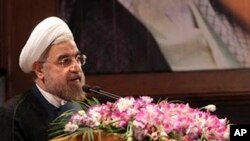Moderate Muslim cleric Hassan Rouhani has taken office as Iran's seventh president, succeeding Mahmoud Ahmadinejad as the country's highest elected official.
Iran's supreme leader, Ayatollah Ali Khamenei, endorsed and confirmed Rouhani's presidency Saturday at a formal ceremony broadcast throughout Iran and abroad. The president's public inauguration before parliament takes place on Sunday.
Rouhani, trained as a lawyer in addition to religious studies he began as a teenager, has held senior political posts in Iran for decades, including leading the nation's team of nuclear negotiators for over 15 years (1989-2005).
In his first speech as president, Rouhani vowed to work to lift Western sanctions on Iran. He said the goal of these penalties was to isolate Iran and push the country towards chaos.
The United Nations Security Council has imposed sanctions on Iran in an effort to pressure it to end its nuclear program. Several countries, including the United States, have imposed their own additional measures.
Rouhani also said Iran's "detractors" and "enemies" have been trying to keep the country in full isolation, to widen the gap between the government and the people. However, he said, strong public participation in the presidential election in June "foiled" this alleged plot.
The 64-year-old cleric will have to deal with huge challenges, including a sagging economy and the outside world's predominantly negative view of Iran's controversial nuclear policies.
The president is Iran's head of government. Iran's supreme leader is the chief of state and gives final approval for major policy decisions.
Even before Rouhani took over from President Mahmoud Ahmadinejad, controversy swirled Friday over disputed press accounts of remarks in which Rouhani referred to Israel.
The Iranian Student News Agency (ISNA) and other Iranian news media quoted Rouhani as calling Israel a "wound ... on the body of the Muslim world" that needs to be "removed." International news agencies also carried the remarks, which were quickly condemned by Israel.
Later Friday, however, Iranian state television said the initial accounts of what Rouhani said were distorted, and it aired video of him telling reporters that Israel's occupation of Palestinian territories "is like an old wound in the body of Islamic society." He did not broadly refer to the existence of the state of Israel.
Iran's supreme leader, Ayatollah Ali Khamenei, endorsed and confirmed Rouhani's presidency Saturday at a formal ceremony broadcast throughout Iran and abroad. The president's public inauguration before parliament takes place on Sunday.
Rouhani, trained as a lawyer in addition to religious studies he began as a teenager, has held senior political posts in Iran for decades, including leading the nation's team of nuclear negotiators for over 15 years (1989-2005).
In his first speech as president, Rouhani vowed to work to lift Western sanctions on Iran. He said the goal of these penalties was to isolate Iran and push the country towards chaos.
The United Nations Security Council has imposed sanctions on Iran in an effort to pressure it to end its nuclear program. Several countries, including the United States, have imposed their own additional measures.
Rouhani also said Iran's "detractors" and "enemies" have been trying to keep the country in full isolation, to widen the gap between the government and the people. However, he said, strong public participation in the presidential election in June "foiled" this alleged plot.
The 64-year-old cleric will have to deal with huge challenges, including a sagging economy and the outside world's predominantly negative view of Iran's controversial nuclear policies.
The president is Iran's head of government. Iran's supreme leader is the chief of state and gives final approval for major policy decisions.
Even before Rouhani took over from President Mahmoud Ahmadinejad, controversy swirled Friday over disputed press accounts of remarks in which Rouhani referred to Israel.
The Iranian Student News Agency (ISNA) and other Iranian news media quoted Rouhani as calling Israel a "wound ... on the body of the Muslim world" that needs to be "removed." International news agencies also carried the remarks, which were quickly condemned by Israel.
Later Friday, however, Iranian state television said the initial accounts of what Rouhani said were distorted, and it aired video of him telling reporters that Israel's occupation of Palestinian territories "is like an old wound in the body of Islamic society." He did not broadly refer to the existence of the state of Israel.





